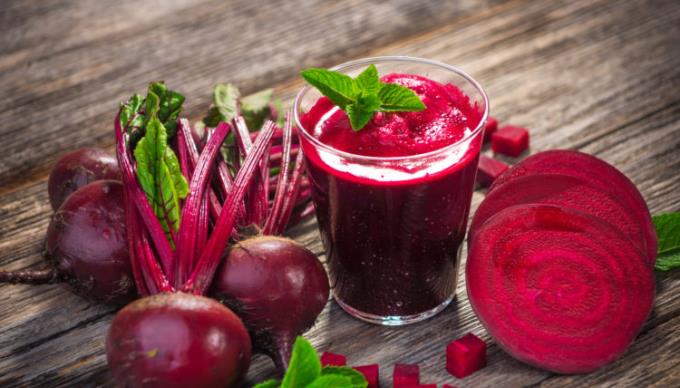Beetroot has long been known for its high nutritional content and miraculous benefits to human health. For pregnant women, a nutritious beets-based diet can provide health benefits for both mother and baby. However, besides the benefits of beets, overeating can cause health problems.
Some pregnant women like to eat sweets, but eating too many sweets can lead to many health risks. That is why experts advise pregnant women to incorporate nutritious foods into their diets. Beetroot not only satisfies your sweet cravings, but it is also one of the healthiest foods you should try.
The nutritional value of beets
Beetroot is a sweet, root vegetable with many healthy properties. Pregnant women should eat beets in the first 3 months of pregnancy to help your baby develop healthy. You can eat beets with raw or boiled vegetables served with green vegetables to increase nutrition. In addition, drinking beets juice also provides a lot of nutrients for your baby.
Energy - 43kcal
Carbohydrate - 6g
Fiber - 8g
Fat - 2g
Folic acid - 11g
Iron - 15g
Manganese - 9g
Omega 3 - 1g
Omega 6 - 6g
Potassium - 1g
Protein - 6g
Vitamin C - 8g
Water - about 88%.
The benefits of beets for pregnant women
1. Improve digestion
Indigestion is a common problem during pregnancy. This condition is quite normal but it causes toxins to remain in the body, hindering the healthy development of the fetus. Eating beets during this time is one way to solve the problem. In addition, the amount of fiber in beets also helps reduce digestive disorders and nourish the fetus. More importantly, these nutrients will help prevent diarrhea, constipation and improve gut health.
2. Nurturing the fetus
Beetroot contains a lot of vitamins and minerals that nutrition experts recommend regular supplements during the first three months. These nutrients help the healthy development of the fetus and prevent congenital diseases. Besides, vitamins A and E in beets are very good for the baby and help the birth process take place more easily.
3. Regulates blood sugar
During pregnancy, eating a lot of sweets can cause your blood sugar to spike. To alleviate the sweet craving, you can eat beets. Beetroot is also sweet but has a low sugar content. This helps to effectively regulate blood sugar levels, especially for women with gestational diabetes .
4. Prevent anemia
Beetroot contains a lot of iron, which helps increase hemoglobin content. Lack of hemoglobin during pregnancy can affect the health of the fetus. In addition, hemoglobin is essential for the health of mothers during and after birth.

5. Blood purification
Beetroot has the function of filtering the blood, which is essential for pregnant women because it helps to reduce the risk of infection for the baby while enhancing the body's stamina, supporting the birth process.
6. Prevent joint pain and swelling
Headaches, back pain, and leg edema are common during pregnancy. You can prevent this problem by eating beets because beets contain betaine, a powerful anti-inflammatory that helps relieve common illnesses such as swelling and pain.
7. Improve metabolic performance
Many doctors recommend supplementing with potassium during pregnancy because this nutrient is good for metabolic activity and electrolyte balance. Adding beets to your diet is the simplest way to get this nutrient. Not only that, beets also help control blood pressure during pregnancy.
8. Prevent osteoporosis
Pregnant women are at greater risk of developing osteoporosis than others. This is why nutritionists encourage you to choose calcium-rich foods to prevent this. Beetroot is rich in calcium and silicon. Therefore, eating beets during pregnancy can help prevent calcium loss in teeth and bones, and reduce the risk of osteoporosis.
9. Improve immune system
The immune system helps to protect the body from bacteria, toxins ... This is why you need to strengthen the immune system during pregnancy so that bacteria cannot reach the fetus. Beetroot is rich in antioxidants that help boost immunity and fight health-damaging factors.
10. Reduce the risk of birth defects in the fetus
Beetroot is rich in folic acid, a nutrient essential for the body's tissue growth. In addition, this nutrient plays an important role for your baby's spine development in the first 3 months of pregnancy. Be sure to eat beets while you're pregnant, so you can ensure your baby's spine is growing well and prevent the risk of birth defects such as spina bifida .
What are the side effects of beets that you should be aware of
Although beets have a ton of health benefits, it also has a few side effects to keep in mind:
Beetroot contains betaine, which can cause symptoms of vomiting, nausea, diarrhea and other digestive problems during pregnancy.
The amount of nitrates present in beets can cause fatigue and weakness during pregnancy
Drinking lots of beets juice during pregnancy can cause laryngeal cord paralysis
Eating a lot of beets can cause urine and stools to turn red like blood. This condition is called beeturia
The high oxalate content in beets can cause kidney stones .
How to add beets to the diet?
You can add beets to your diet by:
Chopped and added to salads
Bake with other fruits and vegetables
Boil and eat as a snack
Make vegetable juice with other vegetables such as carrot, cucumber, celery ...
It is important that you eat the beets correctly for the beets to work. In addition, you should only eat a moderate amount. Before eating, you should consult your doctor to ensure the health of both you and your baby.












